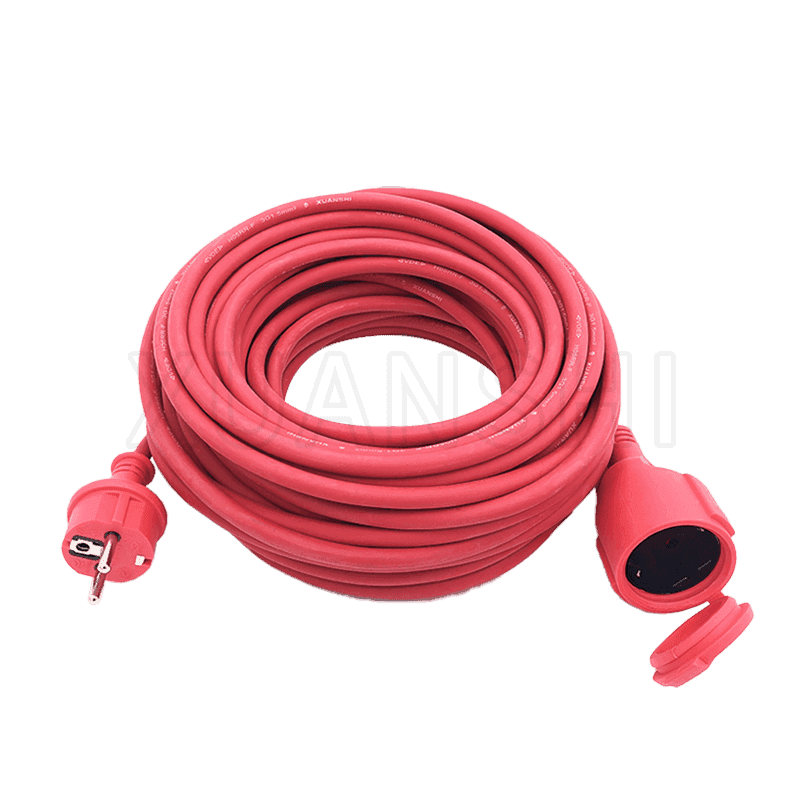Proper storage of socket power extension cords is essential to maximize their lifespan and ensure they remain safe for use. Here are some best practices for storing extension cords:
1.Coil Cords Neatly: When coiling an extension cord, start by grabbing the male and female ends and create a loose loop, then continue making loops until the entire length is coiled. Avoid tightly twisting or kinking the cord, as this can stress the internal wires, potentially causing damage or reduced conductivity.
2.Use Cord Reels: Cord reels or wind-up devices are excellent for organized storage. These devices prevent kinks, tangles, and unnecessary stress on the cord. Electric cord reels often have built-in outlets and handles for easy transport.
3.Label Cords: Apply durable labels to each extension cord with essential information such as its length, current rating (in amps), and any specific usage instructions or safety precautions. Clear labeling aids in quick identification and safe usage.
4.Store Indoors: Whenever possible, store extension cords indoors in a cool, dry, and climate-controlled environment. Extreme temperatures, especially heat, can degrade the cord's insulation and overall integrity over time.
5.Avoid Sharp Objects: Ensure that stored cords are kept away from sharp tools, nails, or other objects that could pierce or damage the cord's insulation. This prevents accidents and maintains cord integrity.
6.Hang Cords Properly: Use wall-mounted hooks or cord organizers designed for cord storage. Hanging coiled extension cords off the ground prevents tangling and minimizes wear and tear.
7.Protect the Ends: Install protective caps or covers on the male and female ends of the extension cords. These accessories shield the connectors from dust, debris, and moisture, reducing the risk of corrosion and maintaining electrical conductivity.
8.Inspect Regularly: Schedule routine inspections of stored extension cords. Look for signs of wear, damage, or fraying, paying close attention to connectors and insulation. If any issues are detected, remove the cord from service and repair or replace it as necessary.
9.Unplug Before Storage: Always disconnect the extension cord from the power source before storing it. This precaution reduces the risk of electrical accidents, such as short circuits, and avoids unnecessary stress on the connectors.
10.Avoid Overloading: Be mindful not to overload storage containers with too many extension cords. Overcrowding can lead to tangling and may cause damage to the cords. Store them in an organized manner for easy access.
11.Store Flat: If using cord reels, store them in a flat position rather than hanging them vertically. This helps maintain the integrity of the cord where it connects to the reel, preventing undue stress.
12.Store in a Dry Area: Keep extension cords away from damp or humid areas, as moisture can degrade the cord's insulation and promote corrosion of connectors. Consider using sealable plastic containers or storage cabinets in such environments.
13.Temperature Considerations: Extreme temperatures, both hot and cold, can impact the flexibility and durability of extension cords. Whenever possible, store cords in a climate-controlled area to prolong their lifespan.
14.Regularly Test: Before using a stored extension cord, perform a continuity test and check for any signs of damage or wear. This proactive approach ensures that the cord remains safe and functional.
Material: rubber cable
Input Voltage and Current: 16A/250V AC
Exterior Color: black, red or customized
Wiring: H05RR-F 3G1.0/1.5/2.5mm²
H07RN-F 3G1.5/2.5mm²
power: Max.3500W
